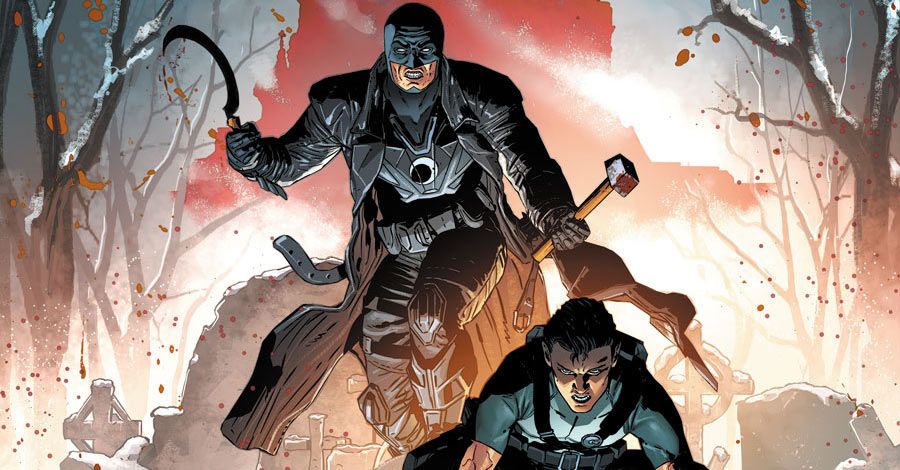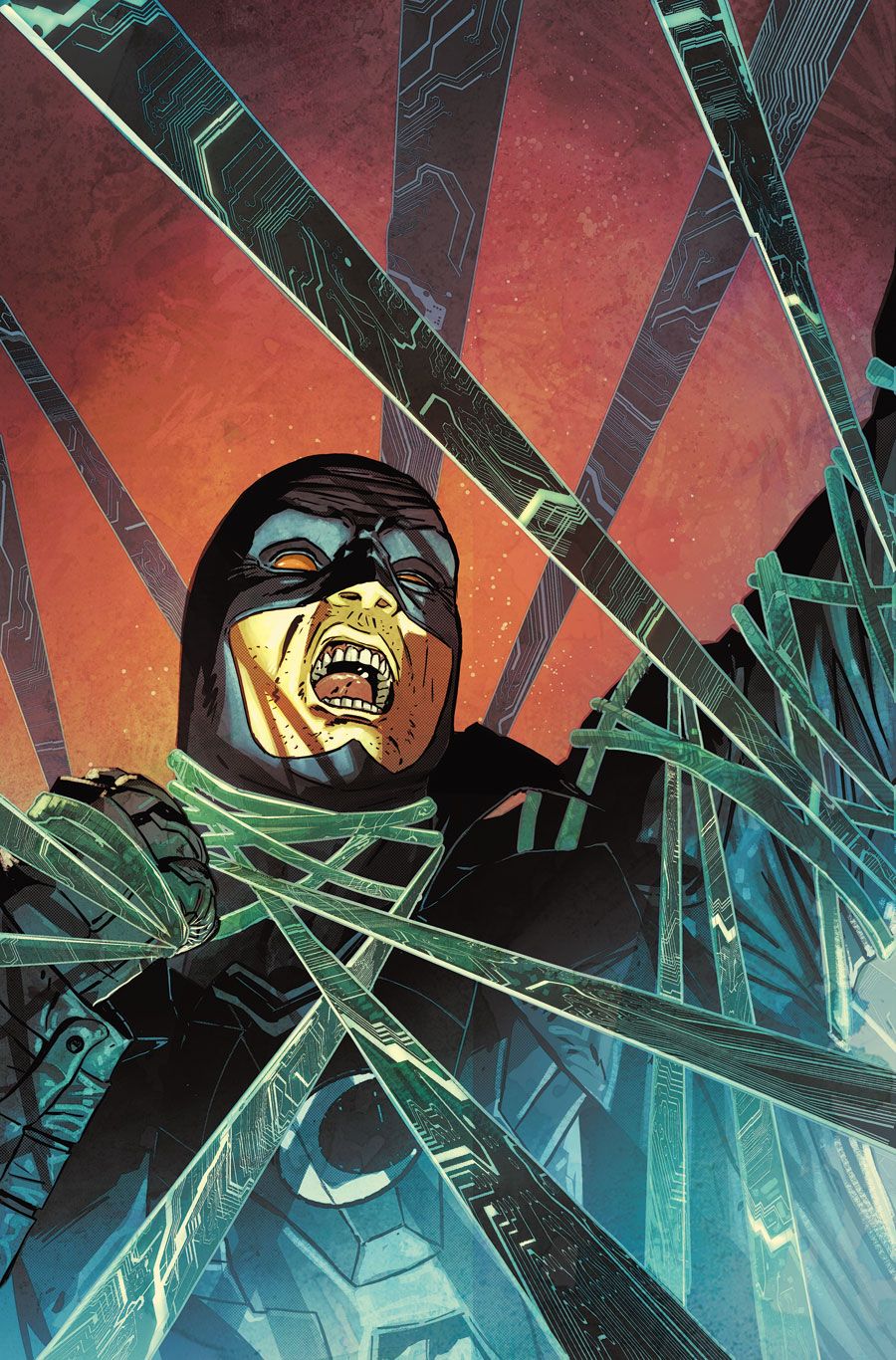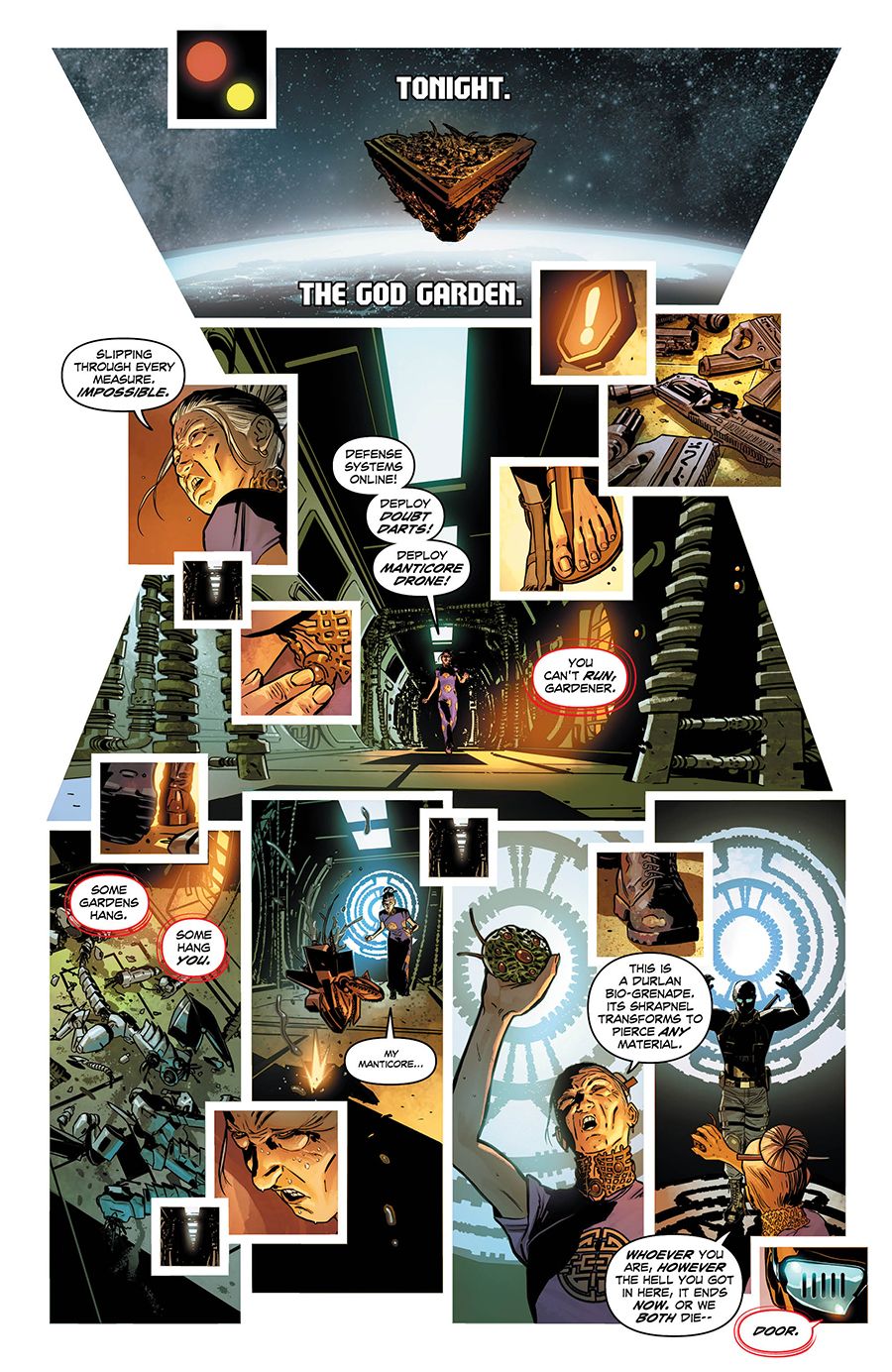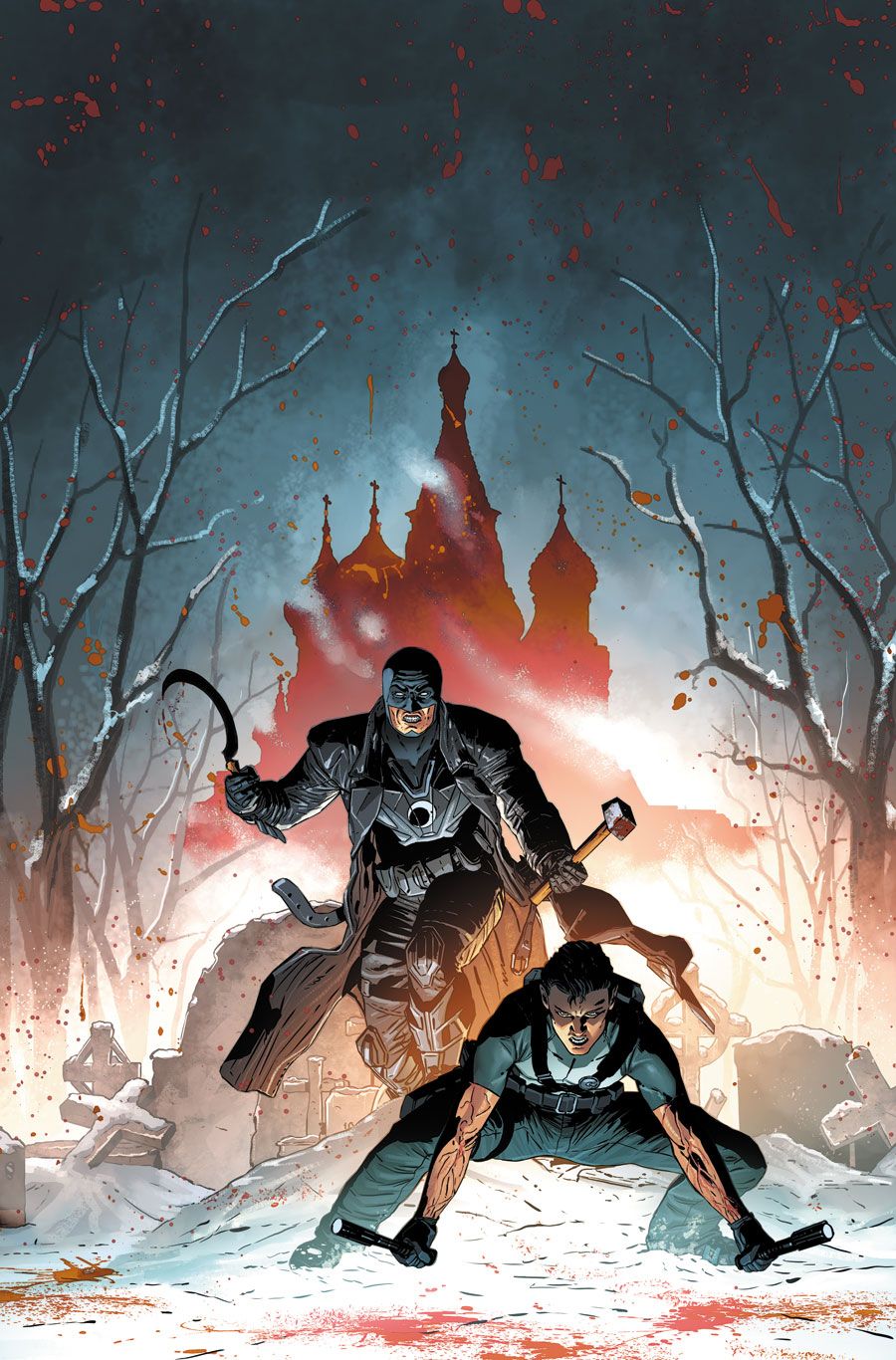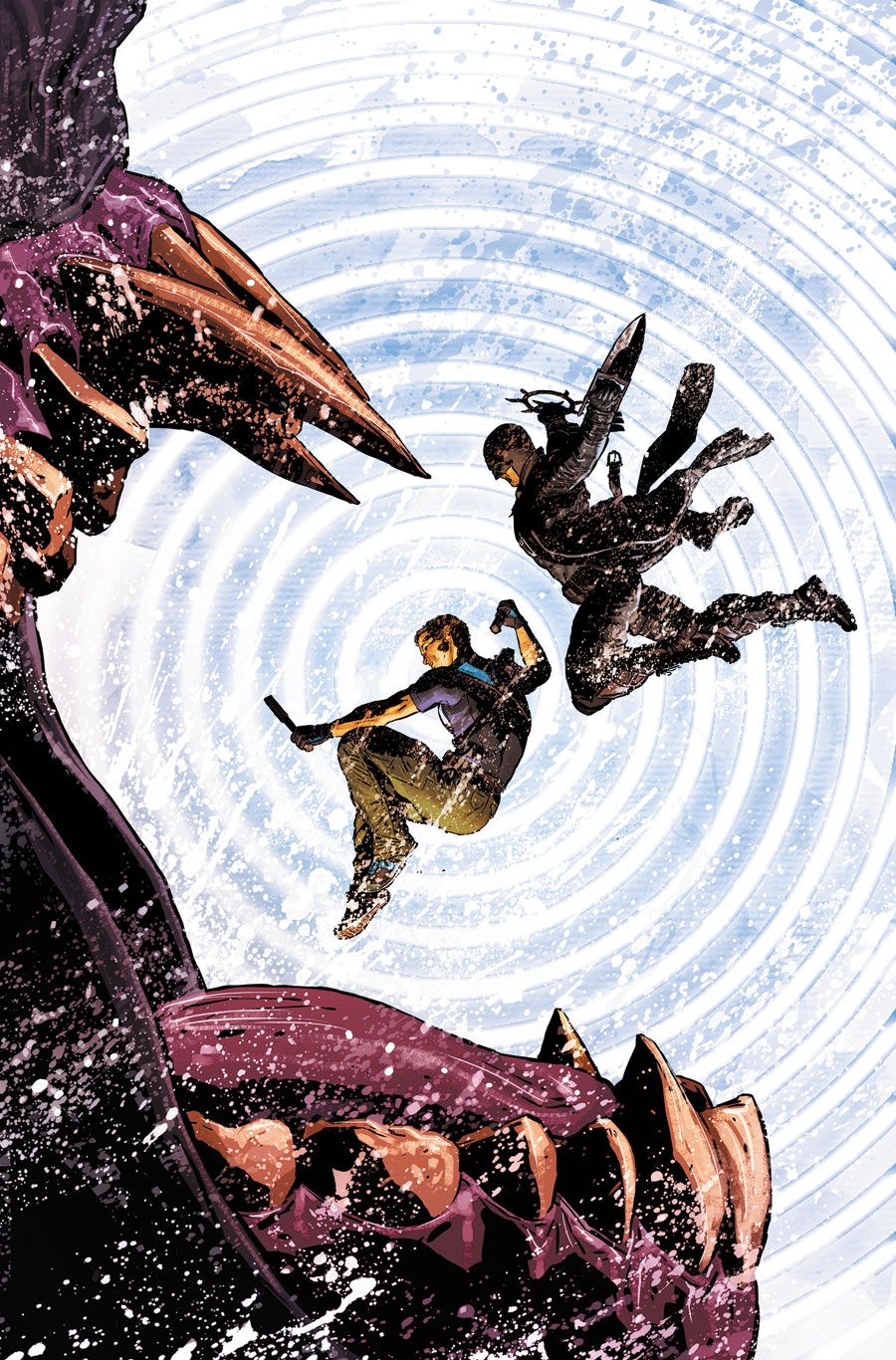Of all the titles that arrived in DC Comics' summer relaunch, one of the more unexpected critical darlings has been the violent, inventive "Midnighter."
Written by Steve Orlando and drawn by creators including anchor artist ACO, the series takes the character from the defunct WildStorm universe and cuts him loose in his new home -- the DCU. Still using his power to see his enemy's moves before they hit to dish out brutal retribution, the character is also making a number of firsts in the book -- including a single life away from his former husband and Stormwatch teammate Apollo.
REVIEW: Orlando & ACO Dazzle in "Midnighter" #3
CBR News spoke with Orlando, and the writer explained how both Midnighter's history as both an inventive anti-hero in the pages of Warren Ellis and Bryan Hitch's "Authority" and as an icon for gay comic readers play into his take on the series. Plus, Orlando details Midnighter's upcoming rematch with superspy Dick Grayson in September's issue #4 -- which features the art of Stephen Mooney -- and his grand design for the single-issue-driven series' major long-form story.
CBR News: Steve, one of the standout elements of "Midnighter" is that you've been able to make a mark on a character that was so clearly defined by the original Warren Ellis material from WildStorm. While still drawing influence from things like "The Authority," how do you keep this series its own thing?
Steve Orlando: I think that we certainly think about Warren and Bryan [Hitch] and the other guys who created the character. And it is intimidating, but it's the right kind of intimidation, I think. They're out there, and they've been nothing but supportive since they found out this series was happening.
And when the character first appeared in the late '90s, he was one of the forerunners when it comes to gay characters in comics. I think he's an iconic character for the gay community even though he's only been around for about 20 years. I think we're living in this moment now where the original creators are out there as a resource, but it's exciting because they can participate. They can pat you on the back. [Jerry] Siegel and [Joe] Shuster are never going to say that the current run of "Superman" is awesome because they're not around to do that. So I think it's exciting to work on the character in a time when I know that Bryan Hitch reads every issue. That's an exciting thing for me. And at the same time, we don't have to do their style, but they did lay the rubric for the character. You only have to do their style in as much as you show the standard of who the character is. So of course he sounds like an Ellis character. He is one! It's written in his personality. But you can still update that character.
There's a lot about the character that is timeless, and with the New 52 universe, it makes a great opportunity for that. It's been easy to broach these characters because when we initially met Midnighter and Apollo in "Stormwatch" in 1998, they already knew they'd found the one. They'd been together for five years. But in the New 52, they'd only known each other a few months at the start. So we're at a point in Midnighter's career we've never seen him in before. I think that's a super exciting opportunity created by the New 52 because you can't compare where he is now to the previous incarnation. Even those readers never got to see him at this point in his life. So this is a great chance to me to work with a character who was important for me and build up that core personality that Warren and Bryan created, but also I can dig into parts of him that no one has seen yet.
INTERVIEW: Steve Orlando on Fighting Back, Speaking Up & Coming Out in "Virgil"
It's all part of the process when you're reintroducing a character. People ask me how I deal with Warren's take or Mark [Millar's] take, and I think that when you're writing for a new audience, you have to whittle things down to the core of the character. People coming into this may be brand new or they may not have read the character in ten or 15 years. They'll come back and say, "This is the guy I love" while new readers will go, "Oh, this is why people love this guy." So doing our kind of primal Midnighter is vital to the book. It's not intimidating in a bad way. It's really exciting.
You mention Midnighter's role as an iconic gay character, and we've been in this debate lately about Marvel's backing away from characterizing its Hercules as bisexual. Even in a diversifying comics landscape, a lead character who is out like Midnighter is still rare. Does that add an extra level of scrutiny on you as you try and portray his life and relationships?
I think you always have to worry... well, worry isn't the right word. You have to be mindful of these things. Whenever you're writing a book that is the first of its kind -- and this is not Midnighter's first comic, but his initial ongoing was the first superhero book at the big two with a gay male lead -- you have to mind the way you're representing that character. Everybody in the community -- and this is not just the gay community but any underrepresented community you can think of -- they're so starved for representation because they haven't gotten it in so long. So everybody will be putting extra eyes on it and everybody will want to see themselves in it. That's a reasonable expectation, but it's also impossible to do in a 20-page action book. So what you really have to mind is making sure that what you are doing is respectful and passionate and well-researched. When you're creating any kind of minority voice in comics, you have to make sure you're making characters and not caricatures. That's the respect you need to give representation.
And you have to work on that representation rather than trying to do everything at once, which is certainly a mindset that exists. If you do something that tries to appeal to everyone a little bit, you'll have something that appeals to no one greatly. A little bit of everything is not a lot of everything. What we've done is try to show that this is a book full of queer characters, but that's not all there is to them. They have jobs. They have opinions. They have relationships of all types and personalities. The fear is that these characters will only be defined by one thing, so we have to make sure that you know as much about them as you'd know about any other person. We treat them as real people, and that's what I think the responsibility is. That's what I worry about: showing that this community is well-rounded and is full of actual people and not just talk boxes for different points of view.
The style of "Midnighter" and "Authority" stories have always been a little cutting edge, and it feels like you guys are working to live up to that legacy as well. I keep asking myself when I see a page in your book full of 45 exploding panels that show all the little details of a fight scene, "How in the hell did he script this?" It seems like that must be a difficult style to pull off monthly.
Well, the way the book happens is that it's truly a collaboration. You're right. I'm not sitting here scripting 18-panel pages, but what I do is make sure all the key beats are on the page, and when I send in the script, it's not the end of my participation. That's the beginning of the conversation. So when I write scripts for ACO, it's all about the e-mails after -- knowing he's going to blow up certain moments and expand on certain moments and giving him room to do that in the layout process as things flow between us. You're right. Not only could I not script an 18-panel page, I wouldn't want to because that would be stifling. It has to happen organically and at the whim of the visual artist. If it comes from the top down, it can be restrictive and mess up the visual timing. But if that's where he wants to go, we can sit in a room and figure out how to do that -- continue the conversation in a way that makes the specific story beats as strong in his storytelling choices as possible.
Orlando Writes a "Midnighter" with "100% Lack of Fear, 100% Lack of Shame"
The results have been outstanding, and that's the main thing. It all comes from the idea that collaboration isn't just turning in a word document and then never speaking to the rest of the team. Even though we live in different countries, our work on the book is an ongoing discussion. And I think that shows on every page.
Coming up in issue #4, you've got the rematch between Midnighter and Grayson. I think this is the fight people were expecting to see since "Midnighter" was announced. Was that one of the first questions you felt you had to address with this new book?
Bringing Grayson in for this upcoming story was always part of the plan, but I think the nature of the relationship is that they're the greatest frenemies in the history of the DC Universe. They have beef, but there's also a grudging respect. It's Murtaugh and Riggs in "Lethal Weapon." They don't like each others' methods or like each other, but they see that they both get it done -- especially from the point of view of Midnighter. He's a guy where if he sees balls, he's going to bust them. So when it comes to someone like Grayson, Midnighter thinks he's hilarious. That's what's great about their interactions. And Grayson is going to fit great into Midnighter's book because while Midnighter is a guy who pushes buttons, few people are as sure about who they are and what they're doing as Dick Grayson. As the counterpoint, he has very few buttons to push, and that pisses Midnighter off.
I think that they probably like each other more than either is willing to admit as far as peer relationships go because neither would want the other one to gain that validation. They wouldn't want to be the first to admit their respect. But at the same time, they both want to help people. That's what's at the core of their respect, but the ways they go about that task are full of tension.
The last major element of the series is the fact that you've found inventive ways to be very brutal in this book. With the Grayson issue, you're even adding vampires into the mix. How is the action going to play as compared to the previous three issues?
The vampires are exciting because when you get to issue #4, it may not be about what you think it's about -- in ways I think are very exciting. And yes, we have an inventive brutality, but the key of the book is about doing that kind of stuff for the right reasons. And in this issue, it's about doing it in a way that differentiates things between Midnighter and Dick Grayson. Really, having Grayson in the mix is what makes this issue feel different. He's a very different kind of fighter than Midnighter. He's graceful and can accomplish different things. He's dexterous in different ways, and he's all about taking advantage of whatever his surroundings are. So you'll have new settings in issue #4 that we haven't seen before. You'll have new characters participating in them too, and that's what keeps things fresh. Just like an action movie, you can't just have the final battle always be at a nondescript foundry. You have to make the setting part of the action, and that's what makes for a truly unique story.
Every issue of "Midnighter" to date has been a stand alone story, though there are a number of subplots connecting everything so far. What can you say about your grand design for the first year of the book?
My grand design for "Midnighter" is essentially Midnighter finding out what Midnighter means. He's doing that in the most violent and aggressive way possible. But from the start, he's going about this business saying, "This is who I am, and this is who I am all the time, regardless of what I'm doing. I'm going to live in an open way like this. It's going to be bold and unlike anyone else in the DCU." So the first story arcs are about him doing that, but once he starts dealing people, he starts to understand what baggage comes with that. It's him going out and hitting people in his own unique way, but then we see what happens when he brings other people along for it.
"Midnighter" #4 ships to comic shops on September 2 from DC Comics.

